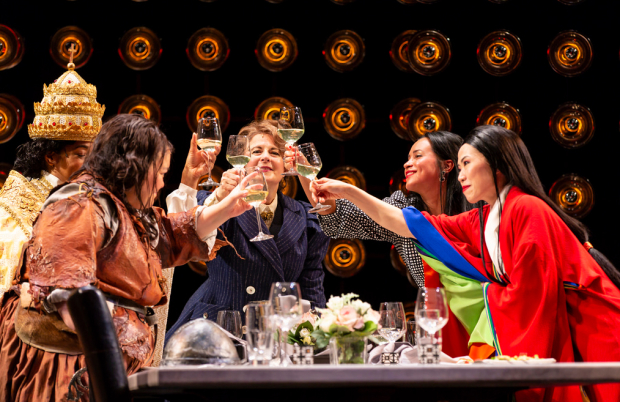Top Girls Still Living in a Man's World

(© T. Charles Erickson)
The dinner party that opens Caryl Churchill's 1982 play Top Girls is one of the great celebrations of 20th-century theater, joined to the total disconnect of the two acts that follow. If the chronology is deliberately scrambled, the playwright's premise is not. Written in Margaret Thatcher-era England, Churchill exposed the perils of life for the girl/woman who succeeds in a man's world. The more things change in the 21st century, the more they stay the same.
A disparate cohort of women from the past — some literary or shrouded in myth, but all self-absorbed — have been summoned to congratulate Marlene (Carmen Zilles) on her promotion to managing director over the head of her boss at the firm where they work. The invited women include Isabella Bird (Paula Plum), a 19th-century Scottish traveler, and Lady Nijo (Vanessa Kai), the 13th-century concubine to the Emperor who later became a nun; Dull Gret (Carmen M. Herlihy), a courageous, aggressive figure from folklore painted by Pieter Bruegel; Patient Griselda (Elia Monte-Brown), a character invented by Chaucer; and the legendary Pope Joan (Sophia Ramos), the 9th-century woman who passed as a man. Dressed in pageant-like, elaborate costumes designed by Linda Cho, a member of the all-female creative team for the Huntington Theatre revival that includes director Liesl Tommy, the characters relate their stories, often interrupting each other to hog center stage. Any idea of empathy or sisterhood is quickly dispelled.
Act 2 changes tone to the British "kitchen sink" style of realistic drama, albeit with experimental, shocking twists. The act takes place in Marlene's sister Joyce's backyard, where Joyce's 16-year-old daughter Angie (Herlihy again) is playing with her only friend, the 12-year-old Kit (Kiara Pichardo). Angie is mentally challenged, socially insecure, hates her mother, and harbors dreams of running away. The action then shifts to Marlene's upscale office, where she and her tone-deaf coworkers interview prospective employees, often in an unsympathetic and condescending manner. Angie appears at the office and announces she has come to stay with her beloved Auntie Marlene, whom she believes will change her life.
The final act travels backward a year in time, when Marlene has returned home to visit Joyce (Ramos) and Angie. Secrets are spilled, along with tears and recriminations, making plain the class difference between Marlene and her sister, who is an impoverished single mother. Marlene swallows guilt with her tea while Joyce, as family caregiver, tastes only bitterness.
Tommy has chosen a diversified group of actors to give a truer picture of what life looks like in today's world. Zilles plays only one role — the tough, hard-drinking Marlene — but the rest of the actors adroitly change between multiple characters. Plum transforms from the assured 19th-century woman of privilege to a repressed burnout seeking a job where she'll be appreciated for doing a man's work. Monte-Brown, guilelessly painting a horrifying picture of Griselda, the obedient wife forced by society to accept the unacceptable, turns into the cynical Nell. Kai casts off the lovely concubine for the sophisticated Win. But it is Herlihy as the war-like lump of a woman, Dull Gret, becoming the needy, hopeless Angie, who steals the show.
In the end, Churchill's play is as engrossing to consider after the lights dim as it is to watch, especially in recognizing the darkness of the never-changing theme. Churchill observed that a woman cannot have it all, no matter how many top girls take the place of top men.











